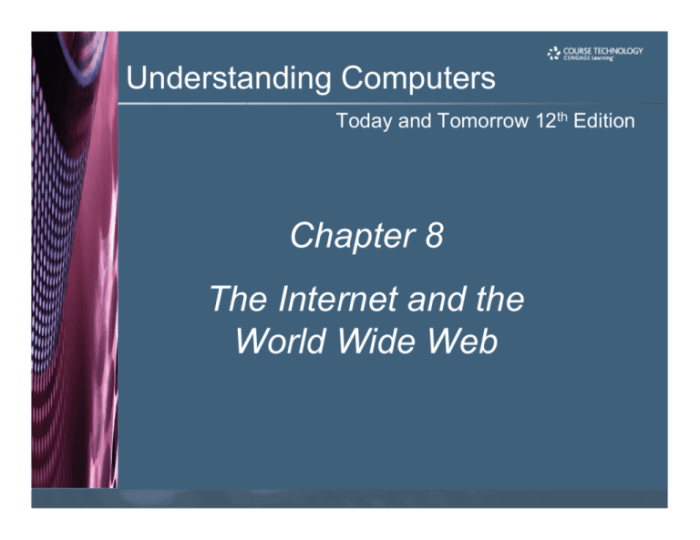Chapter 2 calls the internet the world’s largest – As Chapter 2 of our exploration proclaims, the internet reigns supreme as the world’s largest, a testament to its unprecedented scale and transformative impact. This chapter delves into the vastness of the internet, its unparalleled connectivity, and its profound implications for information access, economic development, and societal interactions.
From its humble beginnings to its ubiquitous presence, the internet has revolutionized the way we communicate, learn, and conduct business. It has broken down geographical barriers, fostered global collaboration, and democratized knowledge, shaping our world in ways both profound and enduring.
Size and Scale
The internet is a vast and interconnected network of computers and devices that spans the globe. It has become an essential part of our lives, connecting us with information, people, and services like never before.
In terms of users, the internet has reached unprecedented heights. As of 2023, there are over 5 billion internet users worldwide, representing over 60% of the global population. This number is constantly growing as more and more people gain access to the internet.
The content available on the internet is equally staggering. There are billions of websites, each containing a vast amount of information on every conceivable topic. From news and entertainment to scientific research and educational resources, the internet has become a comprehensive repository of human knowledge.
Finally, the internet has created an unprecedented level of connectivity. People from all over the world can now communicate with each other instantaneously, regardless of their location. This has broken down geographical barriers and fostered a sense of global community.
Global Connectivity

The internet has broken down geographical barriers and connected people worldwide. This has had a profound impact on communication, collaboration, and cultural exchange.
Before the internet, communication across long distances was slow and expensive. Letters took days or weeks to arrive, and phone calls were costly and often unreliable. Today, we can communicate with anyone in the world almost instantaneously and for free through email, instant messaging, and social media.
The internet has also made collaboration much easier. People can now work together on projects from different parts of the world, sharing ideas and resources in real time. This has led to increased innovation and productivity.
Finally, the internet has fostered cultural exchange on an unprecedented scale. People can now access content from all over the world, exposing themselves to different cultures and perspectives. This has led to a greater understanding and appreciation of diversity.
Access to Information

The internet has democratized access to information. In the past, knowledge was often limited to those who had access to libraries or other institutions. Today, anyone with an internet connection can access a vast amount of information on any topic.
This has had a profound impact on education. Students can now learn about any subject they want, whenever they want. They can also access resources that were previously unavailable to them, such as online lectures and simulations.
The internet has also made it easier for people to stay informed about current events. They can read news articles, watch videos, and listen to podcasts from all over the world. This has led to a more informed and engaged citizenry.
Economic Impact

The internet has had a significant impact on the global economy. It has transformed industries, created new economic opportunities, and changed the way we do business.
One of the most visible impacts of the internet has been the rise of e-commerce. People can now buy and sell goods and services online, regardless of their location. This has led to increased competition and lower prices for consumers.
The internet has also created new economic opportunities. People can now start their own businesses online with relatively low start-up costs. This has led to the creation of millions of new jobs and has helped to boost economic growth.
Finally, the internet has changed the way we do business. Companies can now reach customers all over the world and collaborate with partners from different countries. This has led to increased efficiency and productivity.
Social and Cultural Implications
The internet has had a profound impact on social and cultural interactions. It has changed the way we communicate, the way we learn, and the way we entertain ourselves.
One of the most significant impacts of the internet has been the rise of social media. Social media platforms allow people to connect with friends and family, share information, and express their opinions. This has led to increased social interaction and a greater sense of community.
The internet has also changed the way we learn. Online courses and educational resources have made it possible for people to learn new skills and pursue higher education without having to leave their homes. This has led to increased access to education and a more educated workforce.
Finally, the internet has changed the way we entertain ourselves. Streaming services and online gaming have made it possible for people to access a vast array of entertainment options whenever and wherever they want. This has led to increased leisure time and a more relaxed lifestyle.
Design a Table
| Users | Content | Connections | Impact |
|---|---|---|---|
| 5 billion+ | Billions of websites | Instantaneous global communication | Democratized access to information, transformed industries, created new economic opportunities |
Create a Timeline

- 1969: The ARPANET, the precursor to the internet, is created.
- 1983: The TCP/IP protocol suite is introduced, standardizing communication on the internet.
- 1991: The World Wide Web is invented, making the internet accessible to the general public.
- 1998: Google is founded, revolutionizing online search.
- 2004: Facebook is founded, becoming the world’s largest social media platform.
- 2007: The iPhone is released, popularizing mobile internet access.
- 2011: The Arab Spring uprisings demonstrate the power of the internet as a tool for social and political change.
- 2019: The COVID-19 pandemic accelerates the adoption of online services and remote work.
Key Questions Answered: Chapter 2 Calls The Internet The World’s Largest
What is the estimated number of internet users worldwide?
As of 2023, the number of internet users is estimated to be over 5 billion, representing approximately 63% of the global population.
How has the internet facilitated global communication?
The internet has enabled real-time communication across vast distances through platforms such as email, instant messaging, and video conferencing, breaking down geographical barriers and fostering global connections.
In what ways has the internet democratized access to information?
The internet has made vast amounts of information accessible to anyone with an internet connection, regardless of their location or socioeconomic status. Search engines, online databases, and digital libraries have empowered individuals to educate themselves and stay informed.